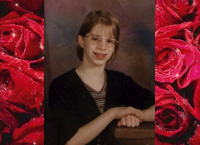

 Organ and Tissue Donor Honored by Washington Regional Transplant Community |
|
|
Kimberly Adams loved life and lived it to the fullest. She was a gymnast and became state champion on the bars at her last competition. Kimberly later took up horseback riding, piano lessons, and soccer. She was also a very caring person. After she died, three friends, one from soccer, gymnastics, and school, each told her family the same story: when they were new to those situations, it was Kimberly who came up to them and made them feel welcome. On November 4, 2000, 12-year-old Kimberly was playing soccer when she started to complain about a headache. The next afternoon, less than 24 hours since the ordeal began, she was declared brain dead. Her parents had long before decided that donation was a good thing. Never did they imagine they would have to make that decision for one of their children. Kimberly made that choice easy for them. She would have insisted. The week before she died, she wrote her goals in her school planner – to learn more math, science and English – and to make more friends and be nice to everyone. There are several things that help the Adams family deal with the loss of their daughter, and organ donation is one of them. “When people first think of the benefits of organ donation, they immediately think of the recipients and how their lives were saved,” said Kimberly’s mother, Susan. “But that is not the only aspect. There is also a benefit to the donor family members who are left behind to deal with the pain and grief." “Kimberly was a very caring and giving person who would have wanted her recipients to live fuller lives. It is also great to know that Kimberly is alive in these other people. The woman with cystic fibrosis who received Kimberly’s lungs spoke of hiking and biking and rollerblading, all for the first time in her life. These were all things that Kimberly loved to do.” |
